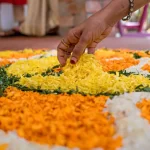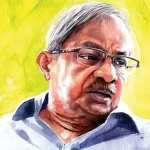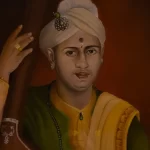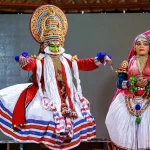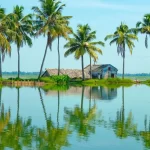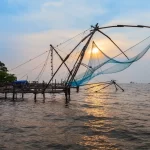The Bharathappuzha River and its tributaries have played an important role in the creation of modern Malayalam literature. Arabi Malayalam compositions, which date back to the 16th and 17th centuries of the Common Era, made significant contributions to the formation of the Malayalam language. These early literary works continue to have an impact on modern language, demonstrating the ongoing legacy of Kerala’s literary history.
During the 17th and 18th centuries, the renowned poet Unnayi Variyar, who lived in Thrissur, contributed significantly to the development of Attakkatha literature. His timeless works have made an everlasting impression on Kerala’s literary scene, influencing future generations of writers and poets.
The poets Kumaran Asan, Vallathol Narayana Menon, and Ulloor S. Parameswara Iyer made significant contributions to the remaking of Keralian poetry. Their work shifted away from ancient sophistry and metaphysics, towards a more poetic and approachable style that appealed to the masses.
The current Malayalam grammar we know today is based on the popular book “Kerala Panineeyam,” written by A. R. Raja Raja Varma in the late nineteenth century CE. This literary milestone established the structure and coherence of the Malayalam language, which continues to thrive.
During the latter half of the twentieth century, renowned poets and writers such as G. Sankara Kurup, S. K. Pottekkatt, Thakazhi Sivasankara Pillai, M. T. Vasudevan Nair, O. N. V. Kurup, and Akkitham Achuthan Namboothiri rose to prominence, earning the prestigious Jnanpith Award for their literary achievements. Their contributions have had an everlasting impact on modern Malayalam writing, earning both national and international recognition.
The modern age saw the birth of writers such as O. V. Vijayan, Kamaladas, M. Mukundan, Arundhati Roy, and Vaikom Muhammed Basheer, whose writings crossed borders and earned them international renown. Poets such as Changampuzha, Uroob, Edasseri Govindan Nair, Kamala Surayya, and Edappally Raghavan Pillai also helped to popularise Malayalam poetry.
Novelists and storytellers such as Thakazhi Sivashankara Pillai, Vaikom Muhammed Basheer, P. Kesavadev, Uroob, OV Vijayan, T Padmanabhan, Sethu, Perumbadavam Sreedharan, Kovilan, M. Mukundan, Kakkanadan, Anand, and Paul Zacharia contributed to the growth of Malayalam literature. Their literary works dug into Kerala’s social, political, and economic fabric, capturing the region’s rich and vibrant spirit.
Notable poets and songwriters include Vayalar Rama Varma, P. Bhaskaran, and ONV Kurup, who have left an everlasting mark on contemporary writing by instilling it with profound insights and emotional resonance. Furthermore, famous critics such as Kuttikrishna Marar, M.P. Paul, M Krishnan Nair, S. Gupthan Nair, M. K. Sanu, Sukumar Azhikode, K.P. Appan, Narendra Prasad, and M. Leelavathy have contributed to the breadth and perspective of Kerala’s literary conversation.
Kavalam Narayana Panicker, a well-known personality in Malayalam literature, has made significant contributions to Malayalam play by exhibiting the state’s cultural history via fascinating narratives and performances.
As you explore the world of Malayalam literature, you will discover an interesting tapestry of storylines that reflect the many facets of Kerala’s social, political, and economic life. From timeless poetry that resonates with political radicalism to engaging novels that give profound insights into the human experience, Malayalam literature invites you to embark on a literary journey that transcends boundaries and captures the essence of Kerala’s cultural identity.
So, as you travel across Kerala’s lovely landscapes, take a minute to immerse yourself in the intriguing world of Malayalam literature, where every page tells a tale and every line reflects the soul of a dynamic and diverse culture.




